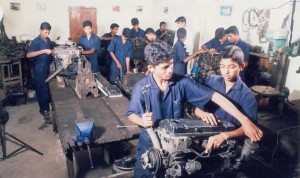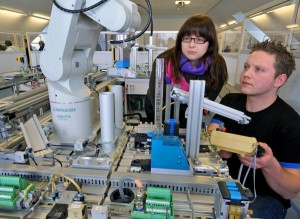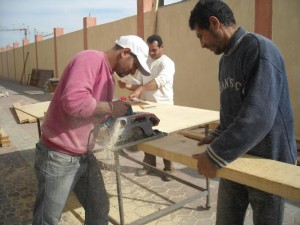In today’s guide, we’ll be discussing the importance of Vocational Training and how it has impacted our world.
See also: Vocational Training Programs/Courses List
This article covers:
- What is Vocation Training (MEANING)
- What Is Vocational Study
- Vocational Skills
- What Is a Vocational Program
- What Is a Vocational School
- Vocational Courses That Pay Well
Vocational Training is also known as career and technical education (CTE) or technical and vocational education and training (TVET)
Education helps us acquire and facilitate: knowledge, skills, values, beliefs, and habits with or without the help of an educator.
Education is often seen as a prerequisite for success.
But, schools and learning institutions have always been a bridge to accommodate the education of an individual.
However, learners may also educate themselves in a process called autodidactic learning.
Education carries a significant benefit in one’s life, it’s normally the doorway to greatness, and it assures you to gain knowledge and awareness that you can use to earn money and credibility.
Article Table of Contents
- 1 What Is Vocational Training
- 2 The connecting link between theory and practical application
- 3 Understanding Vocational Training
- 4 Different Types of Vocational Schools and Training Programs
- 5 What Is a Vocational School?
- 6 Training Programs for Different Trades
- 7 Better performance in Job Interviews and Cost Effectiveness
- 8 Pictures of Vocational Training in Action
- 9 Vocational Training Explained
- 10 Vocational Training in Different Countries
- 11 Vocational Courses that Pay Well
- 12 Conclusion
- 13 Frequently Asked Questions
What Is Vocational Training
What is vocational training?
Vocational training can be described as training that emphasizes knowledge and skills needed for a specific trade, craft, or job function.
Earlier, this training was confined to certain trades like welding, automotive services, and carpentry but the horizon of vocational training has expanded with the evolution of time.
Today, a wide range of job functions like retail training, tourism management, paralegal training, property management, food and beverage management, computer network management, and floral designing are also included under this category.
The connecting link between theory and practical application
Vocational training is also known as vocational education and training (VET) basically focuses on practical applications of the skills learned or acquired and it provides the much-needed hands-on instruction in a specific trade.
Students can abstain from attending general education courses associated with most post-secondary programs and that is why it can be said that VET is basically unconcerned with theory or traditional academic skills.
It works as a connecting link between theoretical education and the real working environment and, students can join these types of programs at the school level or post-secondary level as well.
Vocational Training and Trade institutions have been growing prominently, this causes more innovative and highly skilled workers to solve problems in our current fast-paced society.
Vocational training is a one-of-a-kind learning experience that specializes in the fields of crafts, trades, and careers at various levels. It is also related to apprenticeship learning.
Understanding Vocational Training
Clear edge in job searches and great credibility

VET is also known by the name career and technical education (CTE)’ and it provides candidates a clear edge in job searches because they possess the knowledge and practical experience to enter a specific field.
The training starts at the high school level and students can also complete their associate degree programs from vocational schools.
These courses make them better prepared for taking up highly-rewarding, skilled jobs.
Since an independent organization certifies that the students possess the skills required to perform a specific occupation, the credibility of these types of programs cannot be challenged.
Types of Vocational Training (Trade skills)
Construction Sector:
- Architectural Glass and Metal Technician
- Brick and Stone Mason
- Cement (Concrete) Finisher
- Cement Mason
- Concrete Pump Operator
- Construction Boilermaker
- Construction Craft Worker
- Construction Millwright
- Drywall, Acoustic, and Lathing Applicator
- Drywall Finisher and Plasterer
- Electrician – Construction, and Maintenance *
- Electrician – Domestic and Rural *
- Exterior Insulated Finish Systems Mechanic
- Floor Covering Installer
- General Carpenter
- Hazardous Materials Worker
- Heat and Frost Insulator
- Heavy Equipment Operator – Dozer
- Heavy Equipment Operator – Excavator
- Heavy Equipment Operator – Tractor Loader Backhoe
- Hoisting Engineer – Mobile Crane Operator 1 *
- Hoisting Engineer – Mobile Crane Operator 2 *
- Hoisting Engineer – Tower Crane Operator *
- Ironworker – Generalist
- Ironworker – Structural and Ornamental
- Native Residential Construction Worker
- Painter and Decorator – Commercial and Residential
- Painter and Decorator – Industrial
- Plumber
- Powerline Technician
- Precast Concrete Erector
- Precast Concrete Finisher
- Refractory Mason
- Refrigeration and Air Conditioning Systems Mechanic *
- Reinforcing Rodworker
- Residential Air Conditioning Systems Mechanic *
- Residential (Low Rise) Sheet Metal Installer
- Restoration Mason
- Roofer
- Sheet Metal Worker *
- Sprinkler and Fire Protection Installer
- Steamfitter *
- Terrazzo, Tile and Marble Setter
See the full list here
Different Types of Vocational Schools and Training Programs
Vocational training programs can be classified into different categories and they include certifications, Diploma programs, and associate degree programs as well.
High school CTE programs normally include academic study as well as a wide range of courses and work experience programs, designed to introduce students to different trades. High schools, as well as separate vocational training centers, offer these types of courses and there are part-time courses for students as well.
Community colleges, technical schools, and Career colleges also offer a wide range of VET courses to suit the varying requirements of different students and these types of courses give utmost importance to hands-on training because most of the students who attend these types of programs have their High school diplomas or GEDs.
Students can find a wide range of internet-based vocational training programs as well.
See also – How To Choose The Best Vocational Training School
As a program, it helps bring development to all sectors within a given state.
It is a great program that can highly influence society to move forward and shape the skills of young people who are anticipating joining a competitive market and making a meaningful future.
What Is a Vocational School?
A vocational school sometimes referred to as a trade school, technical school, vocational college, or career center is a type of school/college that offers mainly educational programs that are set to give you a specific profession needed in the job market.
These schools were designed to provide secondary, post-secondary, and skilled trades rather than provide academic degrees.
Some schools do have full degree programs and some even started out as vocational schools and over time they grew to offer academic programs like California Institute of Technology and Carnegie Mellon University.
Education requirements for programs offered in vocational schools are low, meaning getting into a vocational school is usually easier than to a university.
See also – How to Become: Our section on vocational training is designed to help you get the career you’re looking for.
Training Programs for Different Trades
Vocational training programs are offered in different areas including skilled trades, healthcare, cosmetology, computer networking, creative fields, and food preparation as well.
Students can attend these types of programs to become professionals in many careers, such as:
- Auto Mechanic
- Bookkeeper
- Carpenter
- Computer Network Management Specialist
- Cook
- Cosmetology Technician
- Daycare Management Specialist
- Dental Assistant
- Electrician
- Floral Designer
- Food and Beverage Management Specialist
- Heating and Air Conditioning (HVAC) Technician
- Home Inspector
- Interior Designer
- Locksmith
- Medical Assistant
- Medical Transcriptionist
- Paralegal
- Pharmacist
- Pharmacy Technician
- Photographer
- Plumber
- Private Investigator
- Property Management Specialist
- Real Estate Appraiser
- Travel Agent
- Veterinary Assistant
- Veterinary Technician
- And many more…
See also – How To Choose The Perfect Trade School [ULTIMATE GUIDE]
Better performance in Job Interviews and Cost Effectiveness
Today, Life has become extremely fast-paced, and young people have been finding it hard to find a good job in this fiercely competitive world.
That is exactly where the importance of vocational training comes in.
VET or CTE programs offer practical skills that students can put to use in a job and various studies clearly show that students, who have completed VET programs successfully perform better in job interviews compared to students with general academic backgrounds.
These types of programs are less expensive than conventional academic educational programs and they eliminate the disadvantages of the passive activities normally associated with conventional learning by promoting a hands-on training learning style.
Pictures of Vocational Training in Action






Vocational Training Explained
Vocational Training in Different Countries
- Vocational Training in Australia
- Vocational Training in Jamaica
- Vocational Training in Germany
- Vocational Training in Australia
- vocational training in Singapore
- Vocational Training in Ghana
- vocational training in Bangladesh
- vocational training in Japan
- vocational training in Sri Lanka
- Vocational Training in Thailand
- vocational training in Nigeria
- vocational training in Brazil
- Vocational Training in Canada
- vocational training in Finland
- vocational training in Hong Kong
- vocational training in Hungary
- Vocational Training in India
- vocational training in South Korea
- vocational training in Malaysia
- vocational training in Mexico
- vocational training in the Netherlands
- vocational training in New Zealand
- vocational training in Norway
- vocational training in Paraguay
- vocational training in Russia
- vocational training in Sweden
- vocational training in Switzerland
- vocational training in Turkey
- vocational training in the United Kingdom
- Vocational Training in the United States
Vocational Courses that Pay Well
Workers who are in the vocational training sector can find work in numerous industries across the world.
Vocational workers are in high demand and are needed with high priority in countries like Canada, the United States of America, and Australia.
It’s indeed that college is not for everyone and where skilled workers are a concern, it has a huge market to expand and venture in.
With this being said, these are all the high-paying vocational courses, programs, and skills in high demand today,
The list below are high paying skilled trades / highest-paying vocational programs (No degree needed)
| Vocational Course | Description | Avg Annual Salary |
|---|---|---|
| Computer Specialist | Provide technical assistance to computer system users | $60,180 |
| Radiation Therapist | Provide radiation therapy to patients as prescribed by a radiologist according to established practices and standards | $77,560 |
| Nuclear Technician | Nuclear medicine technologists use medical-grade radioactive materials to assist in medical treatment and diagnosis | $69,060 |
| Dental Hygienist | Dental hygienists work under the supervision of licensed dentists | $70,210 |
| Fashion Designer | Fashion designers work on the design of clothing and fashion ranges. | $73,570 |
| Nuclear Medicine Technologist | Prepare, administer, and measure radioactive isotopes in therapeutic, diagnostic, and tracer studies utilizing a variety of radioisotope equipment | $70,180 |
| Commercial Pilot | Pilot and navigate the flight of small fixed or rotary winged aircraft, primarily for the transport of cargo and passengers | $121,408 |
| Electrical and Electronics Repairman | Apply electrical theory and related knowledge to test and modify developmental or operational electrical machinery | $51,220 |
| Web Developer | The role is responsible for designing, coding and modifying websites | $63,160 |
| EKG Technician | Conduct tests on pulmonary or cardiovascular systems of patients for diagnostic purposes. | $70,270 |
| Electrician | Install, maintain, and repair electrical wiring, equipment, and fixtures. Ensure that work is in accordance with relevant codes | $53,560 |
| Plumber | Assemble, install, and repair pipes, fittings, and fixtures of heating, water, and drainage systems. | $44,980 |
| HVAC Technician | Residential HVAC technicians install and repair home heating and air quality systems | $41,000 |
| Surgical Technologist | Surgical technicians assist surgeons and other medical professionals in hospital operating rooms and similar environments. | $44,420 |
| Medical Technologist | Provides information for patient diagnosis and treatment by performing laboratory tests in toxicology. | $62,870 |
| Bricklayer | Lays building materials, such as brick, structural tile, and concrete cinder, glass, gypsum, and terra cotta block | $45,000 |
| Chemical Plant Operator | Control or operate an entire chemical process or system of machines. | $48,576 |
| Derrickman | Align and manipulate sections of pipe or drill stem from a platform on the rig derrick during the removal and replacement of strings of pipe, or drill stem and drill bit | $46,000 |
| Executive Housekeeper | Executive housekeepers are in charge of overseeing and directing the cleaning activities for a business | $34,000 |
| Firefighter | Firefighters are primarily responsible for responding to fires, accidents and other incidents where risks are posed to life and property | $32,000 |
| Locomotive Engineer | Drive electric, diesel-electric, steam, or gas-turbine-electric locomotives to transport passengers or freight. | $85,000 |
| Personal Trainer | Personal trainers help clients to achieve their personal fitness and weight goals | $55,579 |
| Police Officer | Police officers work in partnership with the communities they serve to maintain law and order | $47,921 |
Conclusion
What is vocational training? Within a few years, nobody is going to ask this question because things are changing fast and, more and more people have started joining these types of programs to make their life secure.
It can be said without an iota of doubt that VET programs always make people better prepared to take up highly rewarding and skilled jobs and, these programs also help students become economically independent at a younger age.
Frequently Asked Questions
What are examples of vocational skills?
Vocational training gets a person ready to work in a specific area.
This could be a car repair, electrician, plumber, welding, and many other things that require very specific training.
Additionally, vocational training gives a person both interview and communication skills.
There would also be training in things like task analysis, safety, and how to choose a career.
What is the purpose of vocational training?
The purpose of vocational training is to help students become ready to work in a specific job using specific skills.
The purpose is to give them hands-on training so they can begin work immediately.
They get some valuable experience even before they graduate.
Many trades require vocational training, and this type of training fits in very well with many trades.
What are vocational subjects?
Vocational subjects involve training for specific jobs.
If you were studying to become an electrician, your subjects would all relate to electricity, for example.
Other vocational subjects include things like plumbing, computer repair, automotive repair, and many others.
Vocational education involves three main areas – homemaking education, general labor training, and specific job preparation.
Is vocational course a degree?
A vocational course, or training, is a type of degree but is normally called a certificate.
A degree shows that you have a certain education in a certain subject regardless of what the subject is or how long it takes.
A vocational course can be compared to an associate’s degree from a regular university.
What is the difference between regular and vocational?
The difference between vocational training and regular post-high school education is the scope of the training.
Vocational school teaches a specialized skill with a lot of hands-on training often in preparation for a specific job.
A regular college education does that as well but teaches more the theory or conceptualization aspects of the subject matter.

does this program allow anyone to apply regardless of his or her immigration status?. thanks
I want to know the possibilities of getting a cheap vocational school in canada
I want to come to the school
how will get to known the our whereabout
Good Morning,
My name is Jackie Brown and I am one of the Supervisors of one of 4 Mental Health Association Adolescent Centers in NYC.
We have clients ages 16-22 years of age that are not engaged in school and would like Vocational training. What are some of the trainings you offer for this age group, how long are the trainings, are they completely free, do they have to meet a specific academic criteria, are there incentives, do you provide metro cards, and do they receive employment assistance after the training?
Hi Jackie,
We do not offer any vocational training, this website is here to provide information, you can take a look at this list and try to find a school that will help you with what you need:
https://www.vocationaltraininghq.com/listings/